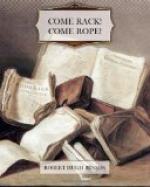Marjorie turned swiftly to the boy as he leaped off.
“In the chapel,” she said, “at Padley.”
Robin stared at her. Then he understood and nodded his head, as Mr. Thomas rode up, his beard all blown about by the wind, breathless but congratulatory.
III
It fell on Robin’s mind with a certain heaviness and reproach that it should have been she who should have carried in her head all day the unknown news that he was to give her and he who should have forgotten it. He understood then a little better of all that he must be to her, since, as he turned to her (his head full of hawks, and the glory of the shouting wind, and every thought of Faith and father clean blown away), it was to her mind that the under-thought had leapt, that here was their first, and perhaps their last, chance of speaking in private.
It was indeed their last chance, for the sun already stood over Chapel-le-Frith far away to the south-west; and they must begin their circle to return, in which the ladies should fly their merlins after larks, and there was no hope henceforth for Robin. Henceforth she rode with Mrs. Fenton and two or three more, while the gentlemen who loved sport more than courtesy, turned to the left over the broken ground to work back once more after partridges. And Robin dared no more ride with his love, for fear that his company all day with her should be marked.
* * * * *
It was within an hour of sunset that Robin, riding ahead, having lost a hawk and his hat, having fallen into a bog-hole, being one mask of mud from head to foot, slid from his horse into Dick’s hands and demanded if the ladies were back.
“Yes, sir; they are back half an hour ago. They are in the parlour.”
Robin knew better. “I shall be riding in ten minutes,” he said; “give the mare a mouthful.”
He limped across the court, and looking behind him to see if any saw, and finding the court at that instant empty, ran up, as well as he could, the stone staircase that rose from the outside to the chapel door. It was unlatched. He pushed it open and went in.
* * * * *
It was a brave thing that the FitzHerberts did in keeping such a place at all, since the greatest Protestant fool in the valley knew what the little chamber was that had the angels carved on the beam-ends, and the piscina in the south wall. Windows looked out every way; through those on the south could be seen now the darkening valley and the sunlit hills, and, yet more necessary, the road by which any travellers from the valley must surely come. Within, too, scarcely any pains were taken to disguise the place. It was wainscoted from roof to floor—veiled, floored and walled in oak. A great chest stood beneath the little east window of two lights, that cried “Altar” if any chest ever did so.




